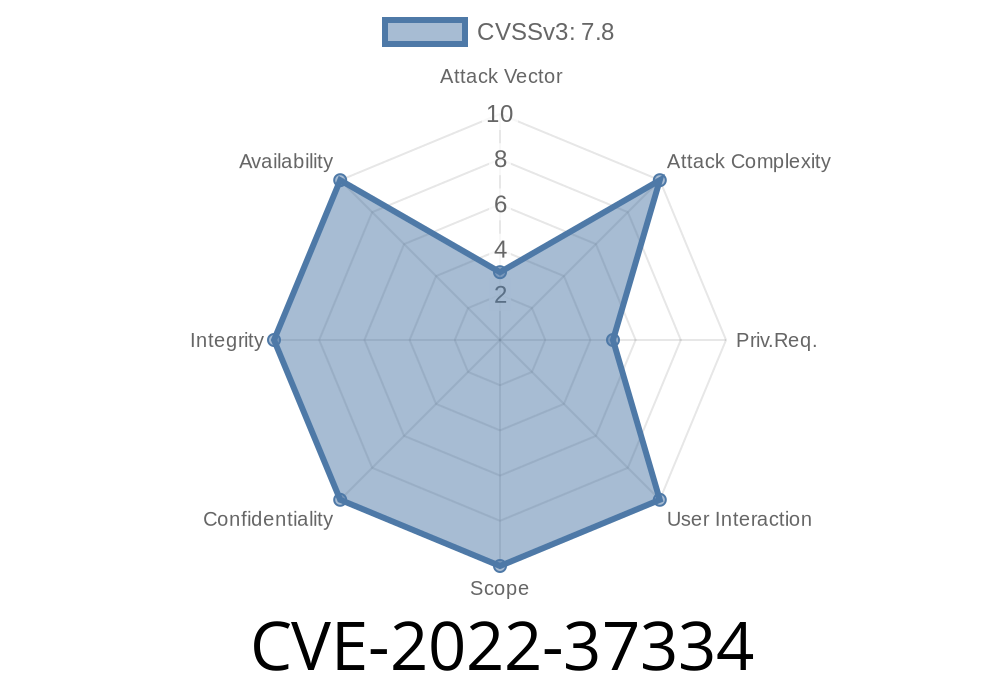---
Intel® NUC (Next Unit of Computing) mini-PCs are popular for their size and performance. But just like any complex system, they can have vulnerabilities—sometimes in unexpected places. One such flaw is CVE-2022-37334, a bug in BIOS firmware for some Intel® NUC 11 Pro Kits and Boards. If your system is running a BIOS version before TNTGL357.0064, you should pay close attention to this post.
In this guide, we’ll dive deep into what CVE-2022-37334 is about, why it matters, and how someone can exploit this flaw to gain higher privileges on your device. We’ll keep the language simple, give you a code example, and direct you to the original resources.
What is CVE-2022-37334?
CVE-2022-37334 is a security vulnerability caused by *improper initialization* in the BIOS firmware on some Intel® NUC 11 Pro Kits and Boards. If a system is running a vulnerable firmware version, a user with local authenticated access could potentially escalate their privileges—meaning, get administrator or even System-level access, which could let them take full control of the machine.
The Technical Details
- Improper Initialization: This usually means that the BIOS isn’t correctly preparing some part of the system’s memory or configuration before passing control to the operating system. As a result, certain privileged settings or data might be left in a state that a regular user account can manipulate.
- Escalation of Privilege: With this bug, a regular authenticated user (not an attacker over the network, but someone already able to log in) could use this flaw to run commands or code as an administrator.
You can read Intel’s official advisory here:
https://www.intel.com/content/www/us/en/security-center/advisory/intel-sa-00734.html
Firmware versions before TNTGL357.0064
If your BIOS is older than *TNTGL357.0064*, you are at risk.
This vulnerability requires local authenticated access. That means
- The attacker must be able to log into the NUC physically or remotely (e.g., over RDP/SSH).
Why Does This Matter?
If your NUC is shared in an office or used by several people, or if malware gets on the machine by any method, this vulnerability offers a way to take over the system—even if the attacker starts with only limited privileges.
User logs into system as a normal user.
2. Attacker prepares code or a script to target the uninitialized/poorly-protected memory or a hardware resource left exposed by BIOS.
3. The code manipulates critical BIOS structures or interacts with hardware in a way not intended, allowing the user to achieve privilege escalation.
*Note*: The exact attack vector is hardware-specific, but typically involves using certain low-level drivers, system calls, or direct memory reads/writes.
Example Exploit (Conceptual)
Suppose the flaw is that a memory region used by the BIOS to store privilege settings is not wiped before boot. Here’s a simple (and fictional but illustrative) PowerShell snippet that could attempt to read normally-protected memory regions on a vulnerable BIOS:
# Example: Attempt to read protected physical memory region (Requires vulnerable BIOS)
$memDump = Get-Content -Encoding Byte -Path '\\.\PhysicalMemory' -TotalCount 1024
[BitConverter]::ToString($memDump)
> ⚠️ This is a demonstration of the *concept*. Actual exploitation would require knowledge of the exact memory addresses and would need specialized tools/drivers.
In more realistic exploits, a tool like RWEverything (Read & Write Everything) or direct use of win32 APIs would be needed to interact with the exposed hardware or memory regions.
Reboot your NUC and enter BIOS setup (usually by pressing F2 at boot).
- Check the current BIOS/firmware version.
Download the latest BIOS update from Intel’s official site:
https://www.intel.com/content/www/us/en/download-center/home.html
3. General Security Hygiene
- Only give physical/local access to trusted individuals.
- Use security software to detect malware that might try to exploit BIOS/hardware flaws.
References and Further Reading
- Intel® Security Advisory SA-00734
- CVE-2022-37334 NVD entry
- What is Improper Initialization? (Mitre CWE-665)
Summary
CVE-2022-37334 is a reminder that even at the very first layer of a PC—the BIOS—improper coding can let attackers grab control. While local access is required, on shared systems or machines exposed to malware, this bug can let a regular user take full admin control.
If you want to see how real-world BIOS vulnerabilities can be exploited, check out these resources
- @cfrei’s BIOS Research
- Eclypsium: BIOS Threats 101
Stay safe and keep your firmware updated!
*This post is exclusive and written for educational awareness. Don't misuse the information. Always test in a lab environment, and update your systems when a fix is available.*
Timeline
Published on: 11/11/2022 16:15:00 UTC
Last modified on: 11/16/2022 16:59:00 UTC
